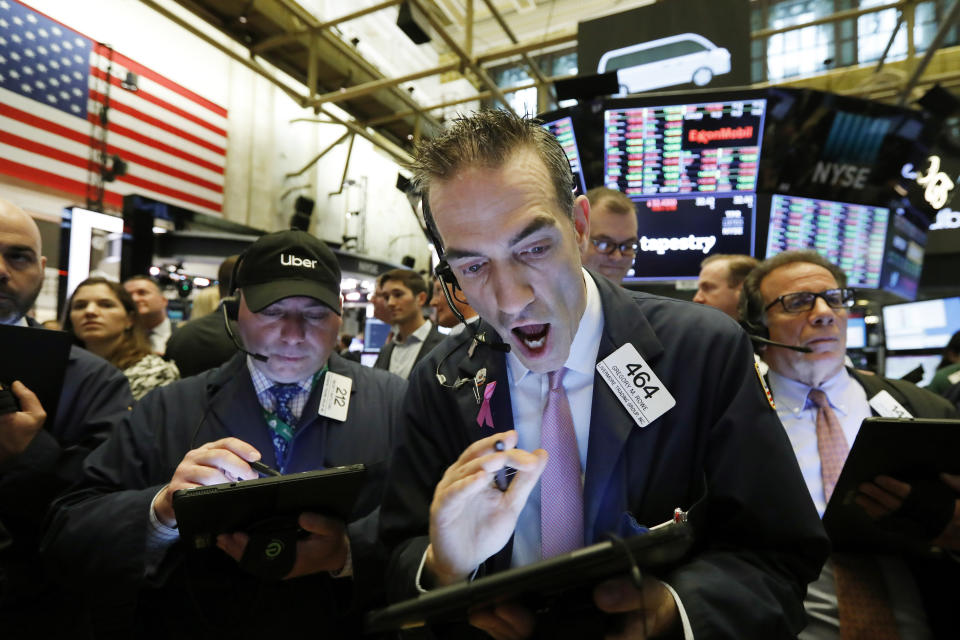Stocks recover some losses amid prospects for further trade talks
U.S. stocks rose Tuesday as the three major indices clawed back some losses from earlier this week.
The S&P 500 (^GSPC) rose 0.8%, or 22.57 points, as of market close. The Dow (^DJI) rose 0.82%, or 207.19 points, while the Nasdaq (^IXIC) rose 1.14%, or 87.47 points.
As of market close Monday, the S&P 500 was down 4.5% since May 3, the last session before President Donald Trump roiled financial markets with an unexpected announcement that the administration would be implementing a higher rate of tariffs on Chinese goods. The index was still up 12% for the year-to-date.
China and the U.S. are set to continue trade talks even amid an escalation of tariffs between the two sides. President Donald Trump said on Monday that he plans to meet with China’s Xi Jinping at the G20 summit in late June, adding in remarks at the White House that he thought it was going to be “probably a very fruitful meeting,” Reuters reported.
Trump echoed this optimism for a trade deal Tuesday morning. In a Twitter post, he wrote that the U.S. will make a deal with China “when the time is right,” and that his “respect and friendship with President Xi is unlimited.”
....of the tremendous ground we have lost to China on Trade since the ridiculous one sided formation of the WTO. It will all happen, and much faster than people think!
— Donald J. Trump (@realDonaldTrump) May 14, 2019
On Monday, news that Beijing planned to implement a tariff rate of as high as 25% on a portion of $60 billion worth of U.S. good starting in June sent the S&P 500 and Dow spiraling to their worst one-day losses since January. The move was an apparent retaliation after Trump’s promised 25% tariff rate on $200 billion worth of Chinese goods took effect late last week.
The U.S. Trade Representative’s office plans to hold a public hearing in June to discuss imposing a 25% tariff rate on an additional $300 billion in Chinese imports. These new tariffs would apply to electronics including cellphones and laptops, but would not include certain pharmaceuticals.
The recent escalation in trade tensions has led a number of firms to slash projections for U.S. economic growth.
“In our new baseline scenario, we assume that the U.S. places tariffs on most, if not all, imports from China over time and China responds with measures of its own, though not in proportion,” Barclays economist Michael Gapen wrote in a note. “We estimate direct net economic losses to the U.S. at 0.2-0.3% of GDP over the long run.”
“Indirect effects from a loss in business or consumer confidence, or from an escalation in financial market volatility, could easily lead to large declines in output and employment,” he added.

Concerns of a trade war topped the list of tail risks investors cited in Bank of America Merrill Lynch’s Global Fund Manager Survey published Tuesday. This marked the eleventh time in the past year that trade war worries led the list, followed by concerns of an economic slowdown in China and apprehensiveness over U.S. politics.
The survey was conducted May 3 to May 9, encapsulating some of the period after President Donald Trump first announced May 5 that he planned to raise the rate of tariffs on Chinese goods.
Additionally, more than one-third of investors surveyed had taken out protection against a steep drop in equity markets over the next three months, according to the report.
The fund managers surveyed “are well hedged but not positioned for a breakdown in trade talks,” Michael Hartnett, BofA Merrill Lynch chief investment strategist, wrote in a note. “Investors see little reason to ‘buy in May’ unless the 3Cs – credit, the consumer, and China – quickly surprise to the upside.”
Emily McCormick is a reporter for Yahoo Finance. Follow her on Twitter: @emily_mcck
Read more from Emily:
Tech companies like Lyft want your money – not ‘your opinion’
Levi Strauss shares jump more than 30% above IPO price at open
Facebook sued by Trump administration for alleged ‘discriminatory’ ad practices
Boeing 737 Max groundings ‘pressure’ U.S. economic data: Wells Fargo
Follow Yahoo Finance on Twitter, Facebook, Instagram, Flipboard, LinkedIn, and reddit.

